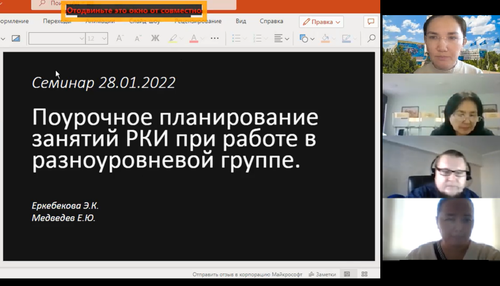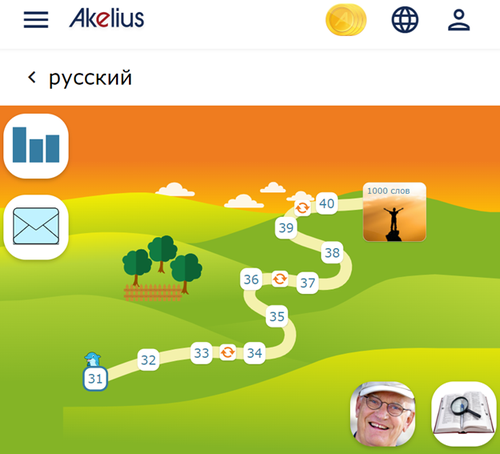On January 28, 2022, IITU experts held a methodological seminar for schoolteachers on the topic "Lesson planning of ‘Russian as a foreign language’ classes when working in a multi-level group." The consultation was held as part of a joint project with Akelius and UNICEF to improve the literacy of children who arrived in Kazakhstan.
IITU methodological experts Associate Professor Elmira Yerkebekova and Assistant Professor Yevgeniy Medvedev told how the task system should be so that children learn the language easily and pleasantly, without realizing that they are learning.

To begin with, the experts recalled what structural parts the lesson has, and then revealed the importance of each of them. As Elmira Kaldybekovna notes, the introductory part of the lesson helps to tune in to work – to activate the visual, auditory, and articulatory analyzers in students. However, in real practice, teachers sometimes neglect the introductory part and immediately proceed to either checking homework or explaining new material.
“It is better to connect the beginning of the lesson with frontal work – an organizational form of activity that includes the entire educational team; this relieves the feeling of tension, allows at first to “distribute responsibility” for the quality of speech activity among students. Phonetic exercises, a short conversation perfectly involve the group in the atmosphere of the language being studied,” she advises.
Experts noted several exercises as examples of phonetic warm-up:
- "Funny monkey": stretch your lips in a wide smile, and then stretch them into a tube (5 times).
- "Watch": move the tip of the tongue left and right along the upper teeth (under the count).
- "Let's brush our teeth": touch the upper and lower teeth with the tip of the tongue.
- "Swing": raise and lower the tip of the tongue out the upper and lower teeth.
- "Snake": move the tip of the tongue between the teeth at a fast pace.
- "Painter": move the tip of the tongue across the roof the mouth.
- "Horses": click the tongue.
- "Pancakes": stick out the tongue and put on the lower lip; raise to the top and hold under the count from for 3,5,7,10 seconds.
- "Slide" put the tip of the tongue on the lower teeth and bend it; and then slowly pull the tongue forward between the teeth (5 times).
Further, during the consultation, the experts spoke about the role of the Akelius platform in the educational process and explained how the teacher should arrange work in a multi-level group so that the lesson is interesting and informative for each student.
“For a teacher, a multi-level group is additional preparation, stress. If there are students of different levels in the group, then it would be good for the teacher to conduct a diagnostic test within the group for himself to better navigate in preparation for classes. The results of the diagnostic test do not have to be told to the student,” recommends Yevgeny Yuryevich.
According to him, on the Internet there are a lot of tests to determine the certification level, for example, Tatyana Esmantova's diagnostic tests. At the same time, it should be noted that the division into “strong” and “weak” students is conditional.
“The multi-level nature of the group is its negative feature, which carries with it a lot of linguistic, psychological, and organizational difficulties. Strong students should not lose motivation and interest in learning, and weak students should not feel insecure, feel inferior, be afraid of making a mistake,” emphasizes Elmira Kaldybekovna.

It is advisable for the teacher to consider all these problematic points at the stage of preparation for the lesson: to think over options for group and pair work, work in a chain, as well as some game methods, and be sure to differentiate the presentation of educational material. During the consultation, the IITU experts told how this can be done using specific examples.
“Educators working with children should look for new forms of work. Make it a fun game. Do not try to pass on to your student all the knowledge that you have. Be a psychologist, feel your student, find out his goals. Don't expect a miracle. You will achieve results only through hard work,” the experts concluded.
